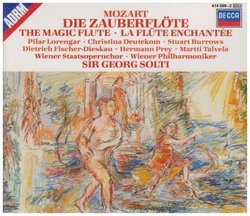| All Artists: Mozart, Lorengar, Solti, Vpo Title: Magic Flute Members Wishing: 0 Total Copies: 0 Label: Polygram Records Release Date: 10/25/1990 Genre: Classical Styles: Opera & Classical Vocal, Historical Periods, Classical (c.1770-1830) Number of Discs: 3 SwapaCD Credits: 3 UPC: 028941456823 |
Search - Mozart, Lorengar, Solti :: Magic Flute
 | Mozart, Lorengar, Solti Magic Flute Genre: Classical
|
Larger Image |
CD DetailsSimilar CDs
|
CD ReviewsStill one of the best Flutes, despite a freakish Queen Discophage | France | 09/14/2007 (4 out of 5 stars) "Remember: Böhm (Mozart: Die Zauberflöte [The Magic Flute]) and Klemperer (Mozart: Die Zauberflote) reigned in those stereo years, and with them an often solemn, even teutonically ponderous conception of The Magic Flute, which still has its adepts today. So Solti came in 1969 like an illumination, and a relief. He made a superb remake in 1990 (Mozart - Die Zauberflöte (The Magic Flute)), but his earlier recording remains excellent. Solti conducts with verve and theatrical life, far removed from Furtwangler (Mozart: Die Zauberflöte), Böhm and Klemperer's "philosophical" longueurs. Sure, he can be relaxed and genial, as in Papageno's arias - his second recording is far more radical here. But then, when Tamino is running from the snake, you really feel his fear, or when Papageno and Pamina run from Monostatos ("schnelle Füsse, rasche Mut"), you can really sense the urgency. Solti's conclusions of both acts sparkle with triumph and joy. Yet he is never hard-pressed, as he sometimes is two decades later. Though his timbre is not in itself particularly beautiful, Stuart Burrows makes a fine Tamino, not as heroic as some from the older generation (Wunderlich, Dermota) but with ease of delivery and a good mix of firmness and softness, and traces of English accent. Unlike some commentators, I don't find him bland. He is great both in the tender moments and the more heroic-affirmative ones, as in his recitative with the Sprecher. Prey is one of the glories of this set, and one of the best Papageno's I've heard, with a rich, creamy voice (no Fischer-Dieskau fussiness here) and a genial, light-hearted characterization. His duet with Papagena is perfect. Yet his preceding "suicide" aria is deeply moving in its pre-Winterreise overtones. Being in agreement with Alan Blyth's opinion that Christie's Rosa Mannion is one of the best recorded Pamina's ever (expressed in his Magic Flute discography published by The Gramophone in January 2006), I am surprised not to concur with him on the subject of Pilar Lorengar, whom he calls "neat but quavery". She has both the qualities of angelic purity and feminine sensuousness that are required from the role, and she is one of the best I have heard (in fact I find myself much in disagreement with everything Alan Blyth writes on this particular recording). I started listening to the first Queen of the Night Aria and I wondered why Deutekom stirred so much controversy. Not only is the voice superb, juvenile but with "body", with the color of a Donna Anna or a Traviata and the stratospheric notes without any thinning. But moreover, Deutekom not only sings, she acts the aria magnificently (what spite she puts in "ein Bösewicht!" - a monster), and you really partake in a mother's plight. And then came the 32nd note vocalise, and what happens there is hard to describe. In addition to being approximative in some of her pitches, it sounds as if she is tapping her mouth with her hand to interrupt the sound like kids playing Indian, or inserting consonants between each note. It sounds like a yodl. It is fascinatingly grotesque, a little like having Alien suddenly erupting out of Sigourney Weaver's mouth - not entirely inappropriate for the Queen of the Night, but pretty unpleasant still. The same thing happens in the second aria - magnificent, powerful, raging, and with superb quarter-note vocalises (those everybody is braced for) - and then come the triplet runs shortly before the end, and she yodles again. Obviously she didn't have the vocal technique for that kind of virtuosity. Too bad those few seconds ruin it all, it's like running the 100 meter way ahead and suddenly doing in your shorts a few steps from the arrival line. I don't find Talvela's Sarastro "uninvolved" (Blyth). He has both the deep-grained basso voice and the ability to vary his characterization (from kindness to overbearing hatred of women) that make the best Sarastros. In Monostatos Stolze's timbre is not particularly beautiful and a bit nasal, but it is appropriate to the character and fully conveys its nastiness. In his third appearance in a recording of Magic Flute (after Fricsay's Mozart: Die Zauberflöte (The Magic Flute) and Böhm), Fischer-Dieskau was promoted from the status of Papageno to that of Sprecher. Hey, maybe he finally withstood the trials after all and was accepted in the Sarastro sect. FD is probably an acquired taste - and I've never acquired it. First, I hear FD's unique light-baritone timbre - not the Sprecher. And as ever, the voice is constantly pushed, played with like an accordion - the man never understood the meaning of the word "simplicity". But granted, this is not as misguided in the Sprecher as it was in Papageno, and his final phrase even has a moving softness. Excellent trio of Ladies, each individually fine and providing a fine blend of timbral color. Solti was apparently the first studio version to use boys for the three Knaben - and these are marginally better than the next generations of Austrian adolescent singers - but for kids really sounding like KIDS, and pitch-right to boot, go to Christie (Mozart - Die Zauberflöte / Mannion, Dessay, Blochwitz, Scharinger, Hagen, Les Art Florissants, Christie). Kollo and Sotin are glorious Armored Men - but no one can quite equal the imposing grandeur of Böhm's King and Talvela (a version I am otherwise not enthusiastic about). The Wiener Staatsopernchor is magnificent and impressive, both in the display of power (how they erupt in the final chorus of triumph!) and in the softest registers (foreboding of Mahler's Resurrection Symphony). The spoken dialogues - tastefully trimmed, not slaughtered, hence the three CDs required to fit it all - are delivered with great theatrical life. Though no actor is credited, I wouldn't be surprised if some were involved: the Tamino shows no trace of Stuart Burrows sung English accent, and I don't recognize the timbre of Hermann Prey's sung voice. If it hadn't been for Deutekom, this would have been a Flute for the ages. As it is, it is still and excellent version (and Deutekom is the circus freak curio here) and certainly one I would not like to part with. " THE SOLTI ZAUBERFLOTE: A DIFFERENT KIND OF MAGIC American Evita | U.S. | 04/22/2008 (5 out of 5 stars) "ABOUT THE ALBUM: Die Zauberflote (Wolfgang Amadeus Mozart): Recorded at the Sofiensaal, Vienna, September and October, 1969, Album Released 1970. CAST: Stuart Burrows, tenor (Tamino) Hermann Prey, baritone (Papageno) Martti Talvela, bass(Sarastro) Cristina Deutekom, soprano (Queen of the Night) Pilar Lorengar, soprano (Pamina) Yvonne Minton, mezzo soprano (Second Lady), Gerhard Stolze, bass (Monostatos) Rene Kollo, tenor (First Armed Man) Hans Sotin (Second Armed Man)Renate Holm, soprano (Papagena), Vienna Philharmonic Orchestra, Conductor Georg Solti
GEORG SOLTI'S TAKE ON THE MAGIC FLUTE: Despite the many available recordings of Mozart's Magic Flute, operaphiles sate their curiosity by listening to this attractive recording from 1969-1970 under the baton of Georg Solti. It's by no means the most perfect album or one of thoses very rare "dream albums" that is flawless in every sense but it still ranks as one of the top Zauberflotes right along with the best of them. The reasons owe more to its musical merits than anythingelse, its musicality and fine efforts by conductor, orchestra, chorusa and singers. Solti was not exactly a definative conductor of opera. He specialized mostly in symphonies and classical music. This did not stop him from conducting many operas which were recorded and attained great successes. The 60's was his most productive decade and his best, as his recordings of Aida (with Leontyne Price), the first studio recorded Ring Des Nibelungen (with Birgit Nilsson) Tristan and Isolde (with Nilsson) and many others. But he was primarily a symphonic conductor and by this time he had many symphonies under his belt including the signature Beethoven Nine Symphonies, the Ninth which featured soloists/singers that sing in this Zauberflote - Burrows, Talvella, Lorengar and Minton). For him to take on Magic Flute was a challenge with inspired results. What makes this Zauberflote so good is his conducting. The Vienna Philharonic is one of the major ones and big ones. The pace is slow, leisurely, beautiful, providing the score with rich detail, tones, colors which piece by piece is slowly built up like a sculpture or work of art/construction "live" to the ears of the audience. Solti may not bring out all the "Magic" but it's still a fine recording in many ways. One good thing about it is the chorus. The Vienna chorus is big, loud, poignant and holy sounding, like a chorus at a Mass or a Cathedral. The symphonic style of this version makes Mozart's original concept of good versus evil as expressed in a Freemason's Opera more powerful. This is an Enlightenment Era fairy tale, about the dueling forces of good versus evil, ignorance versus wisdom and right versus wrong. Sarastro, a God-like, Jesus-like Pseudo-Egyptian spiritual leader is soon to retire and so finds new leaders, the noble Prince Tamino and Princess Pamina. The "evil" side is represented by the Queen of the Night, her Three mysterious Ladies and the Moor Monostatos. They stand for the senses, the flesh, vice, corruption, evil and abuse of power, never mind the sexist connotations of the Queen of the Night being the villain for seeking power herself. ABOUT THE SINGERS: First we have the men. Stuart Burrows was by definition a true lyric tenor. He enjoyed a productive career on stage and had many recordings. He is known for his bel canto operas and he recorded a fine Anna Bolena for Deutsche Grammophone opposite Beverly Sills, he is known for his Alfredo fro Violetta, his Hoffman from Tales of Hoffman (recorded with Sills) Don Ottavio in Don Giovani and many other operas. His voice, so refined, polished and mannered, was suited to more romantic type of roles than heroic (he's no Domingo, Pavarotti, Corelli or Del Monaco). Still, as Tamino in this recording he provides us with a bold, strong Tamino, and his "Die Bildnis" aria is possibly the best rendition. Matti Talvela enjoyed a good career as a bass singer whose repertoire ranged from Baroque to Classical and he was a very fine soloist in oratorios and chorales. His Sarastro may not be especially striking or memorable, but it's beautiful and pure of tone. Hermann Prey, a Mozartian baritone, was also a singer more involved with beautyand purity of tone. He was schooled in the old ways of Mozart operas like his peers Dietrich Fischer Dieskau and Walter Berry. Fortunately for us, he was able to slip into character as a hilarious Papageno. You hear bits and pieces of his "acting" in the arias "Der Vogelfander" and "Ein Madchen oder Wiebchen". Prey had Mozart opera in his blood and scored immense success with Figaro, Cosi Fan Tutte and Don Giovani aswell as Lieder. The other male singers worthy of notice are Rene Kollo and Hans Sotin in the minor roles of the Two Armed Men. Sotin and Kollo would go on to sing Wagner opera and record with Solti again. Kollo had a terrific tenor voice and achieved success for other roles like Tristan. Sotin is featured in Solti's "Ring" cycle and his bass voice was one of the great ones. Here, we hear them blend in with Burrows' Tamino and Lorengars' Pamina in the Trial Scene. Normally, the singers portraying the two Armed Men either do not sing at all and let the principal tenor/soprano team sing or they sing in a hushed and bland manner. But Kollo and Sotin sing harmoniously and beatifully here and the scene becomes a terrific ensemble, which does not diminish the spiritual moment of Tamino and Pamina's reaching Enlightenment. Pilar Lorengar's soprano voice is pure honey. A sweet, golden voice, it's of the old school and she had many similar soprano peers - Gundula Janowitz, Edith Mathis, Anneliese Rothenberger and Elisabeth Schwarzkopf,the latter being the most famous. Lorengar, too, scored great success with Mozart opera. As Pamina, she sings with attention to beauty of tone and dramatic inflection, singing the part with a nearly bel canto like momentum. Her arias reveal her noble character such as the scene: "Herr! Ich bin Zwar Verbreherin" or the scene as she reunites with Tamino for the Trial of Fire and Water. Pamina, like Tamino, is transformed throughout the opera from innocent and inexperienced to wise and enlightened. She overcame despair and suicide to take her place at Tamino's side. Note how she echoes Sarastro's wisdom in the Trial Scene in which she encourages Tamino to be brave: "Wherever you go, I will follow for Love guides me! I shall strew the way with roses, for roses often have thorns". Yvonne Minton is featured here in the mezzo role of the 2nd Lady to the Queen. Her voice is dark and rich, sensual and powerful. Although billed as a minor role here, Yvonne would go on to attain success as a Wagnerian singer, including an awesome Kundry in Parsifal. Cristina Deutekom raises eyebrows. A soprano in a category all her own, she had a long and impressive career in opera singing not only a famed Queen of the Night but heavy dramatic roles such as Abigaille in Verdi's Nabucco, the soprano parts in Verdi's Attila, Lady Macbeth and Bellini's Norma. Her Norma is on recording with Tatiana Troyanos in a performance that raised the roof. Her huge voice was also endowed with coloratura abilities so that apart from the heavy soprano repertoire she was also able to sing Violetta from Verdi's Traviata and Donizetti's Lucia. The Queen heard here is a young Deutekom who was enjoying the initial success of this role. The reason she is so viciously criticized and harshly judged is for her unusual style of coloratura which audiences had never been accustomed to hearing. Instead of a pitch-perfect "Aaaah" sound in the head voice, she uses a "ga ga ga" sound giving the effect that she's gargling water or laughing like Popeye! The hilarious way she sings the final coloratura part in "O Zittre Nicht" actually elongated her career and made her well known in opera. Despite all the jokes about how bad she sounds, her O Zittre Nicht is a fine example of how to sing it - the first part before the coloratura caballeta that tops it off. Deutekom sounds mysterious, dark and strange, perfectly capturing the initial impression of the Queen as she makes her first appearance in the opera. This is a grand and majestic voice, and it's a grand aria. As for her "Der Holle Rache" there is absolutely nothing wrong with it. All the notes are in place, including the High F's and she sings with real fire and dramatic intensity. This is the way Der Holle Rache ought to be sung. While "O Zittre Nicht" can still sound fine in a lighter coloratura voice, Der Holle Rache is a Vengeance Aria. The Queen knows her doom is nigh (at the end of the opera) and she urges Pamina to kill Sarastro with a knife. Light voices like Lucia Popp, Sumi Jo, Beverly Sills, Edita Gruberova and many others sing it as if she is sweet taking Pamina into committing murder. Their cute voices don't scare anyone and hardly pass for an angry queen. The lines are "The Wrath of Hell is burning in my heart...if you don't kill Sarastro, you are no longer my daughter". Thus, the voice must sound furious, angry, and at the same time dramatic and grand. The only other soprano who sang it this way was Edda Moser who sang with a nearly Wagnerian soprano intensity. Another way to look at it is that we have to remember the Queen is about the only soprano villain in all opera. She is the exact opposite of Sarastro. If he's God, so good and noble, than she's Satan, fierce and evil. She must be able to sing as powerfully in her own way as Sarastro sings in his way. If this album doesn't do it for you because you have a problem with its Queen, then the really all-time best is the one conducted by Sawallisch for EMI from a remastered LP album from the 1970's with Edda Moser as the Queen, Peter Schreier as Tamino, Anneliese Rothenberger as Pamina and the great Kurt Moll as Sarastro. The Klemperer Magic Flute with Nicolai Gedda, Elisabeth Schwarzkopf and Lucia Popp has always enjoyed immense popularity but for me it's only because of the beauty of sound. A more noble and dignified Pamina as Schwarzkopf you're hard pressed to fine or a more elegant Tamino as Gedda's or Lucia Popp whose right-on-target lyric coloratura is an audience pleaser. There is also the 2nd Solti Zauberflote with Sumi Jo as the Queen, a Magic Flute with Kiri Te Kenawa as Pamina and another good one is the Ferenc Fricsay album with Rita Streich as the Queen, Dietrich Fischer Dieskau as Papageno. THE SOLTI ZAUBERFLOTE IS A GREAT BEGINNER'S MAGIC FLUTE AND HAS MANY GOLDEN MOMENTS SO THIS IS STILL WORTH LISTENING TO. ENJOY." |

 Track Listings (15) - Disc #1
Track Listings (15) - Disc #1


